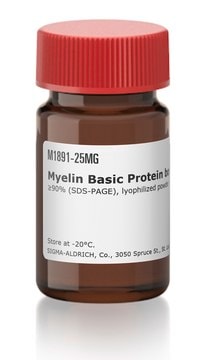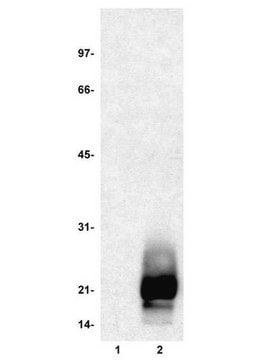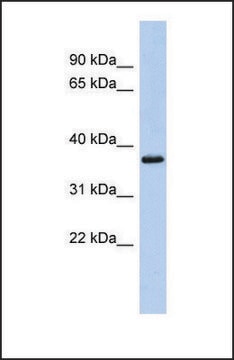Recommended Products
biological source
bovine
Quality Level
form
liquid
shelf life
2 yr
manufacturer/tradename
Upstate®
technique(s)
activity assay: suitable
solubility
water: soluble
NCBI accession no.
UniProt accession no.
shipped in
wet ice
storage temp.
−20°C
Gene Information
bovine ... MBP(618684)
General description
Myelin basic protein (MBP) belongs to the intrinsically disordered protein family. It is localized in the insulating layer of nerve cells in the brain and spinal cord. It is an abundant protein found in the central nervous system (CNS).
Research area: Cell Signaling
MBP is an alkaline protein with a pI of 11.6, constituting approximately 30% of the total protein content of the myelin in the central nervous system.
MBP is an alkaline protein with a pI of 11.6, constituting approximately 30% of the total protein content of the myelin in the central nervous system.
Application
MBP (myelin basic protein), bovine, purified has been used in western blotting and as a standard in enzyme-linked immunosorbent assay (ELISA).
Biochem/physiol Actions
MBP can interact with various polyanionic proteins such as actin, tubulin, Ca2+-calmodulin, and clathrin, as well as negatively charged lipids. Upon binding to these proteins, MBP undergoes structural changes. It is believed to function as a membrane actin-binding protein, potentially enabling its involvement in relaying extracellular signals to the cytoskeleton in oligodendrocytes and tight junctions in myelin. External signals received by myelin or cultured oligodendrocytes lead to alterations in the phosphorylation of MBP, indicating its participation in signaling. The peptide MBP4-14 is specific for protein kinase C and is resistant to phosphatase activity. Moreover, MBP is extensively utilized in the "in gel" kinase assay, making it a vital biochemical for studying protein kinase activities.
Myelin basic protein (MBP), known as the ‘executive molecule of myelin′, helps in the formation of central nervous system (CNS) myelin. Elevated levels of MBP in the cerebrospinal fluid (CSF) are detected in acute neurological disorders like exacerbating multiple sclerosis, and traumatic brain injury. It is also observed at increased levels during chronic progressive disorders including dementia, tumor cerebri, and metabolic disorders.
Quality
routinely evaluated by successfully phosphorylating MAP Kinase 2/Erk2, active (Catalog # 14-173)
Physical form
10mM MOPS, pH 7.0, with 0.05% sodium azide
Storage and Stability
2 years at -20°C
Other Notes
This product is derived from bovine source. Export of this product to certain countries may be restricted. Please contact Customer Service or your local distributor to inquire about product availability and export options.
Legal Information
UPSTATE is a registered trademark of Merck KGaA, Darmstadt, Germany
Disclaimer
Unless otherwise stated in our catalog or other company documentation accompanying the product(s), our products are intended for research use only and are not to be used for any other purpose, which includes but is not limited to, unauthorized commercial uses, in vitro diagnostic uses, ex vivo or in vivo therapeutic uses or any type of consumption or application to humans or animals.
Storage Class Code
12 - Non Combustible Liquids
WGK
nwg
Flash Point(F)
Not applicable
Flash Point(C)
Not applicable
Certificates of Analysis (COA)
Search for Certificates of Analysis (COA) by entering the products Lot/Batch Number. Lot and Batch Numbers can be found on a product’s label following the words ‘Lot’ or ‘Batch’.
Already Own This Product?
Find documentation for the products that you have recently purchased in the Document Library.
Customers Also Viewed
Myelin basic protein: a multifunctional protein
Boggs JM
Cellular and Molecular Life Sciences (2006)
A C Maroney et al.
The Journal of biological chemistry, 276(27), 25302-25308 (2001-04-28)
CEP-1347 (KT7515) promotes neuronal survival at dosages that inhibit activation of the c-Jun amino-terminal kinases (JNKs) in primary embryonic cultures and differentiated PC12 cells after trophic withdrawal and in mice treated with 1-methyl-4-phenyl tetrahydropyridine. In an effort to identify molecular
Tuoping Luo et al.
Proceedings of the National Academy of Sciences of the United States of America, 109(8), 2860-2865 (2012-02-11)
Approximately 30% of human cancers harbor oncogenic gain-of-function mutations in KRAS. Despite interest in KRAS as a therapeutic target, direct blockade of KRAS function with small molecules has yet to be demonstrated. Based on experiments that lower mRNA levels of
Purification of myelin basic protein from bovine brain
Chevalier, Dominique and Allen, Bruce G
Protein Expression and Purification, 18(2), 229-234 (2000)
Dajun Sang et al.
eLife, 8 (2019-08-14)
Protein kinases are crucial to coordinate cellular decisions and therefore their activities are strictly regulated. Previously we used ancestral reconstruction to determine how CMGC group kinase specificity evolved (Howard et al., 2014). In the present study, we reconstructed ancestral kinases
Our team of scientists has experience in all areas of research including Life Science, Material Science, Chemical Synthesis, Chromatography, Analytical and many others.
Contact Technical Service










